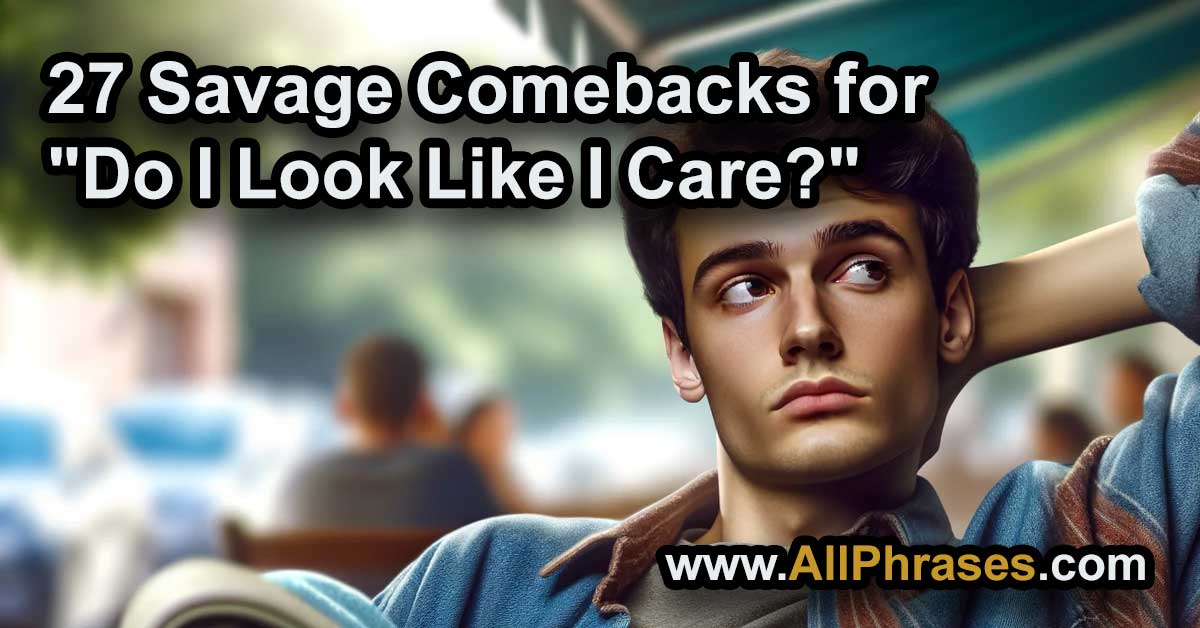Stumped for a response when someone hits you with a “Do I look like I care?” Well, not anymore.
Brace yourself as we unleash 27 of the most savage comebacks that will leave your conversational opponent speechless.
These comebacks aren’t just words; they’re verbal swordplay, designed to be sharp, witty, and a little bit edgy.
Perfect for those moments when you need to stand your ground with a pinch of sass and a whole lot of confidence.
#1 – “You could’ve fooled me.”
- A sly way of saying their lack of interest isn’t as convincing as they think.
#2 – “Well, you’re doing a great impression of it.”
- Sarcastically suggests that they appear to be caring, even if they claim they don’t.
#3 – “No, and you don’t look like you understand sarcasm either.”
- A double-edged comeback that not only addresses their question but also pokes fun at their understanding of sarcasm.
#4 – “Does it matter? You’re still hearing me out.”
- Points out that despite their claim of disinterest, they’re still engaged in the conversation.
#5 – “On the contrary, you look like someone who just lost their last care to give.”
- Implies they used to care but have now run out of patience or interest.
#6 – “Not particularly, but since when did that stop anyone?”
- Suggests that people often pretend to care even when they don’t.
#7 – “Hard to tell, you’ve always had that uncaring look.”
- A cheeky remark indicating that their expression of disinterest is a permanent trait.
#8 – “You could win an award for that look.”
- Comically suggests their expression is so convincing it could be award-winning.
#9 – “No, but you do look like you’re trying too hard to prove it.”
- Suggests their effort to appear uncaring is actually quite evident and overdone.
#10 – “Even if you did, I wouldn’t believe it.”
- A response indicating their reputation for not caring is so well-known that even a caring expression wouldn’t be credible.
#11 – “No, but you look like you’re about to.”
- Implies that they are on the verge of showing interest or concern, despite their words.
#12 – “The jury’s still out on that one.”
- A humorous way to say that it’s still up for debate whether they care or not.
#13 – “Why, is it your new look for the season?”
- A playful jab suggesting their uncaring attitude is just a fashionable facade.
#14 – “Not with that poker face.”
- Points out their expressionless face, making it hard to tell what they really think or feel.
#15 – “Hard to say, you’ve mastered the art of indifference.”
- Compliments them sarcastically on their ability to appear uninterested.
#16 – “You look like you care about pretending not to care.”
- Highlights the irony in their effort to appear apathetic.
#17 – “With that attitude, you could be a professional non-carer.”
- Jokingly suggests they are so good at not caring, it could be their profession.
#18 – “No, but you do look like you’re waiting for me to care about that.”
- Implies they are seeking a reaction or validation for their statement.
#19 – “You look more like you’re wondering why you asked.”
- Suggests they might be regretting their question or statement.
#20 – “That’s your ‘I don’t care’ face? Needs work.”
- A playful critique of their attempt to look disinterested.
#21 – “I wasn’t aware we were in a caring competition.”
- Suggests the absurdity of measuring how much either of you care.
#22 – “Looks more like confusion than indifference to me.”
- A witty response indicating that their expression conveys confusion rather than disinterest.
#23 – “Debatable, but let’s pretend you don’t.”
- Acknowledges their claim but suggests continuing the conversation regardless.
#24 – “You’re giving off mixed signals here.”
- Points out the inconsistency between their words and their demeanor or actions.
#25 – “No, but you sure look like you’re asking for a reason to.”
- Implies that their question is an invitation to make them care about the topic.
#26 – “I can’t tell, your ‘I care’ face and ‘I don’t care’ face look the same.”
- A humorous observation that their expressions for caring and not caring are indistinguishable.
#27 – “Guess your caring days are over, huh?”
- A tongue-in-cheek remark suggesting they once cared, but those days are long gone.

